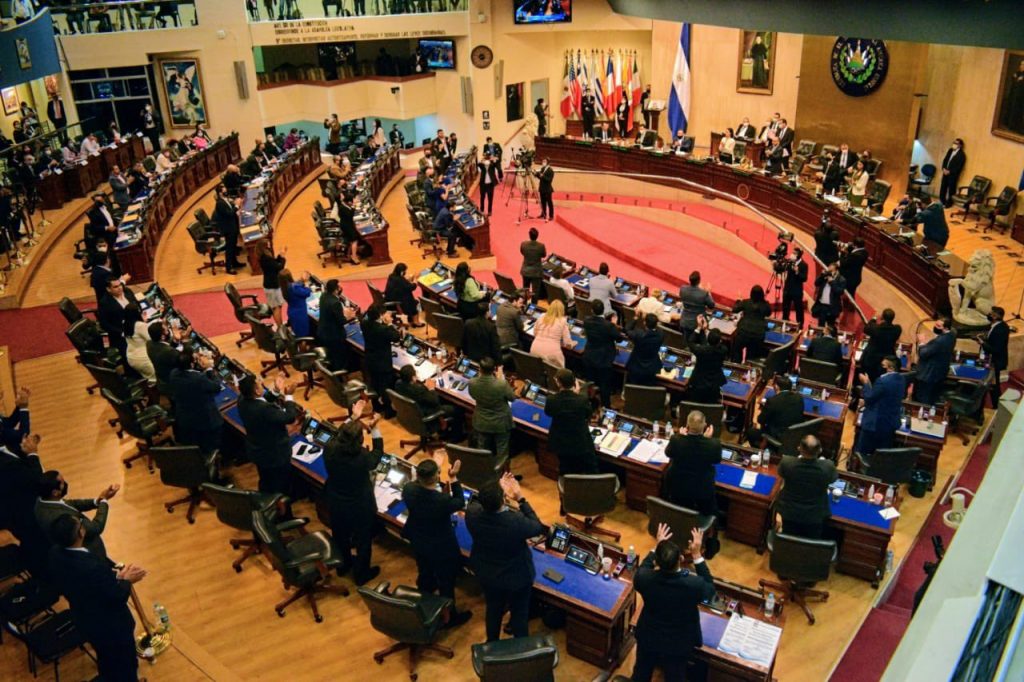RIO DE JANEIRO, BRAZIL – The Salvadoran ruling party took the reins of the Legislative Assembly on Saturday, and its first action was to vote to dismiss the magistrates of the Constitutional Chamber of the Supreme Court and the attorney general, Raúl Melara.
In the last year, President Nayib Bukele had clashed on more than one occasion with these officials over judicial decisions and investigations by the Public Prosecutor’s Office.
Faced with reactions from representatives of governments of other countries, Bukele noted on Twitter that “we are cleaning house.”

“To our friends in the international community: we want to work with you, trade, travel, get to know each other, and help in whatever way we can. Our doors are more open than ever. But with all due respect: we are cleaning our house” and “that is none of your business,” the president posted.
There were 64 legislators of the 84 that make up the Legislative Assembly who voted for the dismissal of the magistrates and the Prosecutor, who were elected by previous legislatures.
The votes were cast by the ruling parties Nuevas Ideas (NI), Gran Alianza por la Unidad Nacional (GANA), Partido Demócrata Cristiano (PDC) and Partido de Concertación Nacional (PCN).
THE TWO CHAMBERS?
Minutes after the vote to remove the magistrates, the Constitutional Chamber issued a ruling in which it declared the decision unconstitutional for attacking the system of government.
“This is because, with a marked intention of suppressing the effective controls towards the Executive and Legislative Branch, it negatively affects the control of the exercise of power carried out by this chamber”, reads the ruling.
The magistrates that the deputies voted to dismiss are the president of the Supreme Court of Justice (CSJ) José Armando Pineda, and the magistrates Aldo Enrique Cáder, Carlos Sergio Avilés, Carlos Ernesto Sánchez and Marina de Jesús Marenco.
Manuel Escalante, deputy director of the Institute of Human Rights of the Central American University (Idhuca) and doctor in constitutional law, indicated that with the ruling, “the decision of dismissal does not take effect”, since it was issued before the plenary session concluded.
EL SALVADOR WITHOUT CONTROLS
Analysts and human rights defenders warned that, with the dismissal of the constitutional magistrates, the country is left without counterweights to control the actions of the Government and the Legislative Assembly.
“The CSJ (Supreme Court) is the instance to turn to in the case of abuses of power and violation of constitutional rights. To dismantle it by decree is to leave the citizenry without protection and to break with one blow the necessary inter-institutional control between the three branches of government”, said Celia Medrano, candidate for the Executive Secretariat of the Inter-American Commission on Human Rights (IACHR).
For Medrano, this situation is “the ambition of total control made concrete”, which means that “they seek to have no control or power that could stop arbitrary and illegal actions”.
Eduardo Escobar, director of the organization Acción Ciudadana, warned that the situation could worsen if the security forces are involved in the foreseeable crisis the country will face.
TECHNICAL COUP D’ETAT
For Escobar, the decision to depose the magistrates could be considered a “rupture of the constitutional order” and a “technical coup d’état”.
The main businessmen’s syndicate, the National Association of Private Enterprise (ANEP), cataloged in a communiqué the actions of the new Legislative Assembly as a coup d’état.
“We condemn the attack against democracy”, said ANEP in a statement in which it called on the international community to condemn the actions of the Legislative, which seek “the total concentration of power in the hands of the Executive” of Bukele.
For Abraham Ábrego, of the human rights organization Cristosal, the country is “heading towards a dictatorship”.
The opposition parties, which with 20 deputies cannot stop these decisions, also denounced the “coup d’état”.
U.S. REACTION
The United States on Saturday made the possibility of a “strong relationship” with El Salvador conditional on the government of that country supporting the separation of powers and upholding democratic norms, according to Acting Assistant Secretary for Western Hemisphere Affairs, Julie Chung.
Before the impeachment votes took place, Chung assured on Twitter that Washington viewed “with concern the proposal of some members of the Legislative Assembly to remove the five magistrates of the Constitutional Chamber of El Salvador”.
“An independent judicial body is the foundation of any democracy; no democracy can survive without that,” the official complemented.
Juan González, U.S. President Joe Biden’s top Latin America advisor, also criticized the decision. “This is not the way to do it,” he wrote in Spanish on his Twitter account, reacting to a message posted on the same social network by America’s director of Human Rights Watch (HRW), José Miguel Vivanco.

